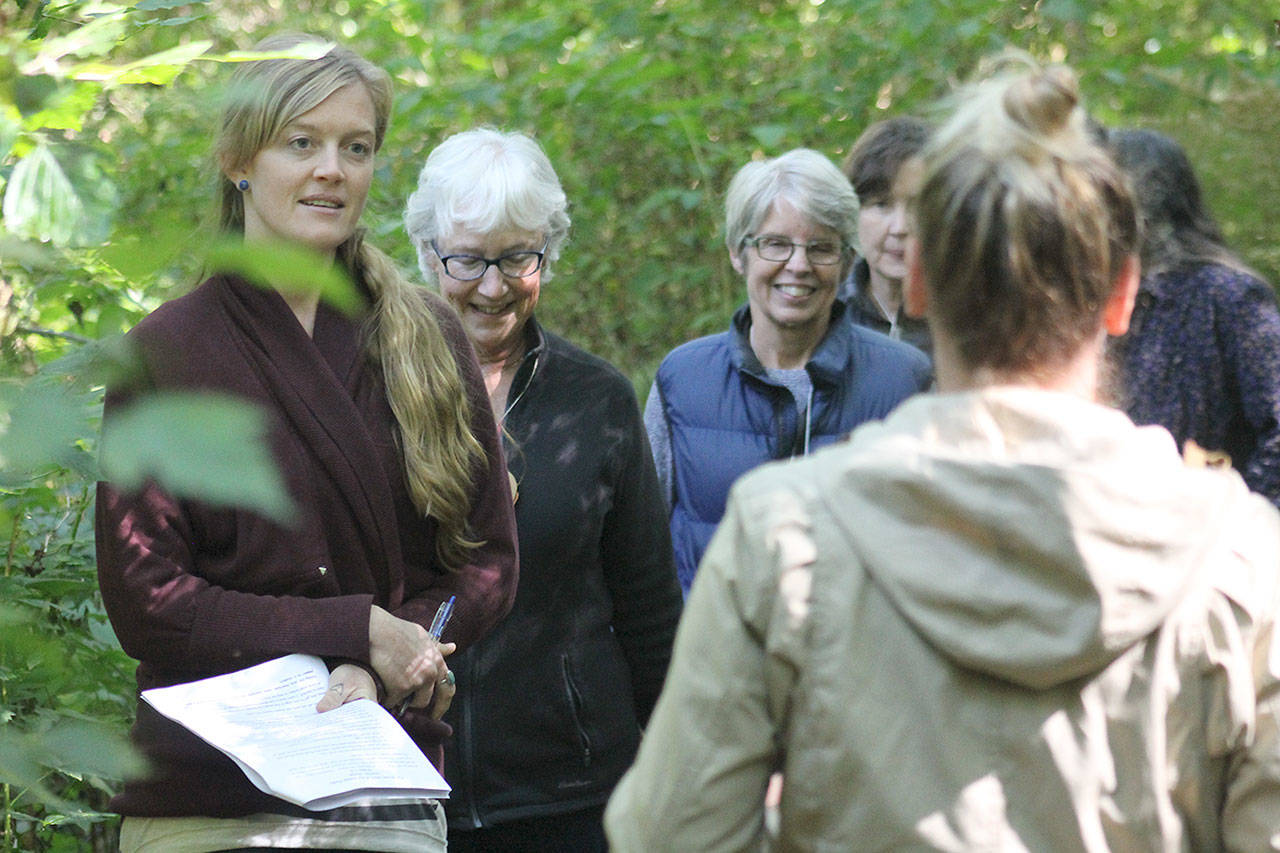As much as salmon and students are integral to the Maxwelton Outdoor Classroom, so are its volunteer teachers.
The backbone of the Whidbey Watershed Stewards, they’ve spent the past 20 years providing environmental education, stewardship and firsthand examination of nature to thousands of students, according to Lori O’Brien, the organization’s education coordinator.
“The volunteers are the program,” O’Brien said. “It’s an avenue for people to give back to their community and inspire kids.”
The Maxwelton Outdoor Classroom will celebrate its 20th anniversary next month. An event honoring the contributions of founders, supporters and others at 2:15 p.m. on Oct. 25 at the outdoor classroom on Maxwelton Road.
The Whidbey Watershed Stewards are specifically recognizing the founders of the outdoor classroom who started the program from the ground up, such as Rene Neff, Nancy and Steve Scoles, Dave Anderson, Rich Shaughnessy, Don Meehan and the South Whidbey Rotary Club. Their efforts led to the construction of the classroom, the vision for the curriculum and other amenities that make up the bulk of the program today.
Volunteers will continue to be relied upon to continue the program this fall season, which begins on Sept. 26 and runs through mid-November.
Over 1,000 students in grades K-6 from South Whidbey, Oak Harbor, Lake Stevens and other areas are expected to participate in the outdoor classroom throughout the fall season. Because of the high numbers, the volunteers are asked to teach at least one day a week, though it is preferred that they teach multiple days.
The volunteers recently wrapped up training sessions on Sept. 15 and Sept. 19, which serves as a crash course for the fall curriculum’s theme of “Salmon in the Ecosystem.” They learned everything from the anatomy of a salmon to constructing three-dimensional salmon models using paper to illustrate the structures and functions of the fish. Each fall and spring has a different theme, as the spring’s will be “Habitats and Creatures.”
The volunteers will teach students how to preserve and care for the salmon habitat through storytelling along the banks of the Maxwelton Creek. They’ll also show them how spawning salmon use their sense of smell to migrate back to their home stream to ensure their cycle of life continues, what a typical salmon experiences in different stages of its life and how people can help protect the earth.
Lee Chavez of Langley began volunteering in 2007 and is the among the most tenured of the bunch. Her motivation to continue teaching is the same as it’s always been.
“I just really enjoy getting our younger generation into the outdoors,” Chavez said.
While many of the South Whidbey students are accustomed to classroom area, it’s usually new territory for students from urban areas such as Oak Harbor.
“It’s like the first time they’ve really been out here,” Chavez said. “They didn’t even know what nettles were. But, everybody has fun. I think they really enjoy it.”
Clinton resident Raquel Jensen is brand new to the outdoor classroom. She sees it as a way of giving back to the community, while also getting to spend time outdoors.
“I was home schooled, so I spent a lot of time outdoors,” Jensen said. “It sounded really cool. I saw it on drewslist.”
It also helps that she enjoys the subject matter of science, nature and storytelling. Jensen isn’t new to teaching as she’s taught at church camps, Sunday school and sports camps, but she’s eager to see how things will turn out at her first session.
“I don’t how I’ll be,” Jensen said. “I haven’t done it in a while, but I’m excited.”
Clinton resident Wendy Visconty, who is also on the Whidbey Watershed Steward’s board, has volunteered for two or three years. She believes it’s vital for future generations to understand the need to preserve the environment. Visconty doesn’t have formal training as a teacher, so she is sometimes stressed out by the lessons and having to manage kids at the same time. Fortunately, the kids usually make it easy on her.
“They get so engaged, that I get over that real fast,” Visconty said. “They know more than I expect sometimes. A lot of times they know more than I do. I’m always amazed by how much they understand and already know about this wonderful place.”
Amy McInerney, an environmental educator for the Whidbey Watershed Stewards, will lead storytelling sessions about salmon and the ecosystem. She said volunteers not only benefit from giving back to kids, but also from teaching the material.
“They always end up leaving with a lot more knowledge about these topics as well,” McInerney said. “I think that surprises people sometimes. It reinforces these concepts for the teachers as well. And they get such a kick out of learning from young students.”



